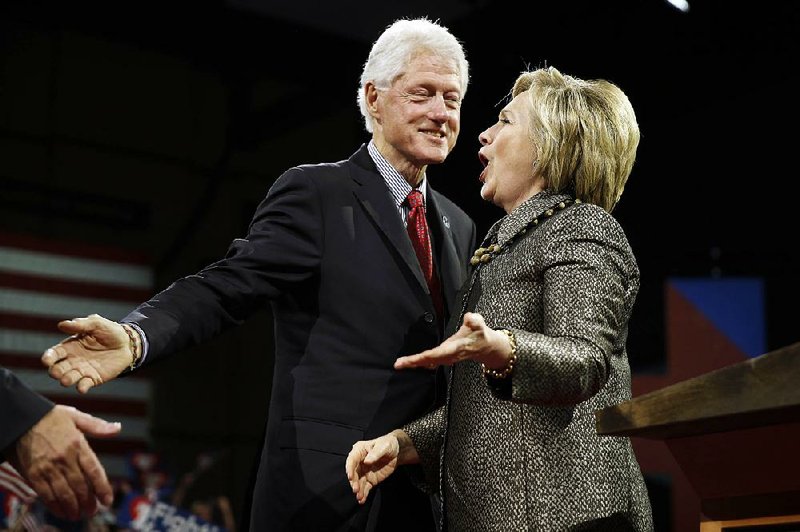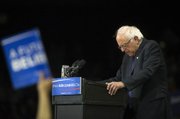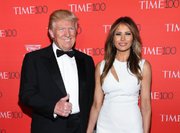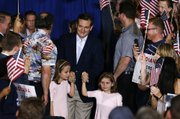PHILADELPHIA -- Republican Donald Trump swept all five Republican primaries Tuesday -- in Connecticut, Delaware, Maryland, Pennsylvania and Rhode Island -- in a commanding showing across the Northeast that keeps the Republican front-runner on his path to the GOP nomination.
FULL ELECTION COVERAGE
Hillary Clinton carried Democratic contests in Connecticut, Delaware, Pennsylvania and Maryland, emerging from Tuesday's contests on the brink of becoming the first woman nominated for president by a major party. The night was not a shutout for Bernie Sanders, who found success in Rhode Island.
Trump's victories added to his delegate totals, but the Republican presidential nomination remains undetermined. The New York businessman is the only candidate in the three-man race who could possibly clinch the nomination through the regular voting process. He needs 1,237 delegates to avoid a contested GOP national convention vote.
Fellow GOP candidates Ted Cruz and John Kasich are trying to keep him from that magic number and to push the race to a convention fight, where complicated rules would govern the nominating process.
The U.S. senator from Texas and the governor from Ohio announced plans to coordinate in future contests to minimize Trump's delegate totals. Kasich agreed to withdraw from campaigning in Indiana, and Cruz ceded two later states, Oregon and New Mexico, to Kasich.
Trump was having none of that. "It's over. As far as I'm concerned it's over," he declared at his victory rally in the lobby of Trump Tower in New York. "I consider myself the presumptive nominee."
He later added in response to a reporter's question: "I think the party is seeing me that way" as well,
Trump has railed against their coordination, calling it "pathetic," and said efforts to push the nomination fight to the convention is evidence of a rigged process that favors political insiders.
With his victories Tuesday, Trump will get at least 82 of the 118 delegates up for grabs in Tuesday's contests.
In Pennsylvania, Trump collected 17 delegates for winning in that state. An additional 54 delegates are elected directly by voters -- three in each congressional district. The delegates names are listed on the ballot but with no information about which presidential candidate they support.
Those delegates will attend the GOP convention as free agents, able to vote for the candidate of their choice.
Cruz spent Tuesday in Indiana, which votes next week. Indiana is one of Cruz's last, best chances to slow Trump, and Kasich's campaign is pulling out of the state to give the Texan a better opportunity to do so.
"Tonight, this campaign moves back to more favorable terrain," Cruz said during an evening rally in Knightstown, Ind. His rally was held at the "Hoosier gym," where some scenes were filmed for the 1986 movie Hoosiers, starring Gene Hackman as the coach of a small-town Indiana basketball team that wins the state championship.
Cruz repeatedly said Kasich was "pulling out" of Indiana, but Kasich's campaign continued to raise money in the state, and Kasich plans to meet with Republican Gov. Mike Pence.
"I have laid out a strategy, and I have not told anybody to not vote for me," Kasich said Tuesday, noting that he simply isn't campaigning in Indiana. "I don't tell people how to vote."
Cruz, meanwhile, urged Kasich's supporters to support him, attempting to paint himself as the only candidate who could win the primary and general elections. Trump, he said, could win the nomination but not the general election, and Kasich could win the general election but not the primary.
"If you don't want to hand the election to Hillary Clinton, do not vote, I ask you, for Donald Trump, but if you want to beat Donald Trump, don't vote for John Kasich either," he said Tuesday on WPHT radio in Philadelphia.
The rivalry between Cruz and Kasich fueled doubts about the arrangement among voters and Republican elites, who worried that Cruz and Kasich have handed Trump a ready-made argument that the party establishment is plotting against him. Trump said as much in stump speeches after the deal was announced.
Even though the agreement supposedly affects only three later-voting states, it weighed on some voters in Pennsylvania.
"I don't want Cruz to win -- I just don't," said Carolyn Moy, 68, before casting her vote for Kasich in McKees Rocks, Pa., where Kasich grew up.
Of Cruz, she said, "I don't like him, and I think it's telling that nobody in the Senate likes him. I guess they're trying to get rid of Trump, but I have mixed emotions about that, too. All I know is that Kasich needs to stay in, because the other guys can't beat Hillary."
Others were attracted by the pact. Ann Kleinrichert said she voted for Cruz because of the alliance he made with Kasich. She planned to support Trump but has been turned off by his behavior, she said.
"When Cruz and Kasich merged together, I decided, yeah, I love both of them," said the 51-year-old, who voted in Annapolis, Md.
Many Republican voters at Annapolis High School appeared to be conflicted about their choices in the presidential contest. Dave Griffin, a 63-year-old homebuilder, said he wanted an outsider who could shake up the system, but he settled for Kasich because the Ohio governor "seemed to be the most reasonable" among all the GOP presidential contenders.
"It's kind of one of those things where you hold your nose and vote," he said.
The Democrats
The Democrats were vying for a proportional share of the 462 pledged delegates Tuesday, with the bulk coming from Pennsylvania, Maryland and Connecticut.
Clinton kept her focus firmly on the general election as she spoke to supporters Tuesday night in Philadelphia, urging Sanders' supporters to help her unify the Democratic Party and reaching out to GOP voters who may be unhappy with their party's options.
"If you are a Democrat, an independent or a thoughtful Republican, you know that their approach is not going to build an America where we increase opportunity or decrease inequality," Clinton said of the GOP candidates.
Sanders spent Tuesday campaigning in West Virginia, where he drew several thousand people to a lively evening rally as polls closed.
"This campaign is not just about electing a president. It is about transforming our nation," Sanders said at the outset of his remarks to about 6,400 people in Huntington, W.Va. "It is about having the courage to demand a political revolution, and you are the revolutionaries."
He urged his supporters to recognize that they are "powerful people if you choose to exercise that power."
Sanders noted Tuesday that the fall election is not a "closed primary," like recent party contests have been. Independents, he said, "will be voting all over this country for the next president."
Only registered Democrats were permitted to vote in Tuesday's primaries. Sanders has polled better in states with open primaries, which allow people to vote for either party regardless of affiliation.
But by Tuesday night, there were some signs that Sanders' campaign was coming to grips with his difficult position. Top aide Tad Devine said that after Tuesday's results were known, the campaign would "decide what we're going to do going forward."
"Is our path to the nomination affected by five states' voting? Yes," Devine said. "Is something dramatic going to happen? No, I don't think so."
Sanders, in a late interview, conceded that he has a "very narrow path and we're going to have to win some big victories."
For her part, Clinton shows no signs of expecting Sanders to drop out. She spent Tuesday in Indiana, the next battleground.
"No matter the results in Pennsylvania or the other states, Bernie should continue to campaign and give his supporters in California a chance to vote for him, and should even go to the Democratic convention and fight for his ideas," said Edward Rendell, a former Pennsylvania governor who is supporting Clinton.
Ahead of Tuesday's results, Senate Democratic leader Harry Reid said that while Sanders has run a "unique and powerful" campaign, he does not believe the senator will be the party's nominee.
At Friendly High School in Fort Washington, Md., Frances Brown and Tyrone Cooper cast their ballots for Sanders.
"He seems to understand our people more. He has been on the front lines," said Brown, 26, who is black. "I feel like this may be his time."
Erika Dickstein of Bethesda, Md., said she voted for Clinton but that she "didn't have a great level of enthusiasm" over her Democratic choices for president. Asked why she voted for Clinton, Dickstein let out a long sigh and hunted for the words.
After several seconds, she said, "Of the options available, I feel like she's got the best chance to win." She added, "And it'll be great to have a woman."
Ahead of Tuesday's polling, Clinton had 1,474 delegates compared with Sanders' 1,170. The former secretary of state's lead jumps to 1,993 compared with Sanders' 1,209 when factoring in superdelegates -- party leaders and elected officials who may support any candidate. It takes 2,383 to win the Democratic nomination.
In Indiana, Clinton narrowly defeated Barack Obama in the primary there in 2008. Clinton supporters said her showing in Tuesday's primaries -- and her rout of Sanders in New York last week -- would retain her advantage in Indiana.
"A lot of Democrats still believe that Mrs. Clinton would make a great president, and a lot of them also want a winner in November -- and she looks more and more like a winner," said Dennis Tyler, mayor of Muncie, Ind., and a Clinton backer. "While our area has lost a lot of good-paying manufacturing jobs, and Sen. Sanders has a way of tapping into that, I think Democrats are ready to rally around Mrs. Clinton and help her get ready to take on Trump and the Republicans."
Information for this article was contributed by Julie Pace, Catherine Lucey, Michael Rubinkam, Ken Thomas, Laurie Kellman, Chad Day, Stephen Ohlemacher and Hope Yen of The Associated Press; and by Alan Rappeport, Patrick Healy and Yamiche Alcindor of The New York Times; by David Fahrenthold, Abby Phillip, David Weigel, Arelis R. Hernandez, Sean Sullivan, Katherine Shaver, Josh Hicks, John Wagner, Rachel Weiner and Ed O'Keefe of The Washington Post; and by Sahil Kapur of Bloomberg News.
A Section on 04/27/2016



